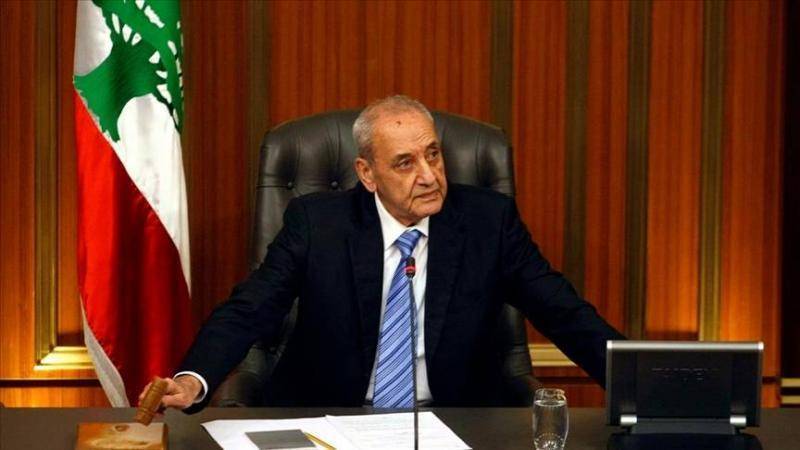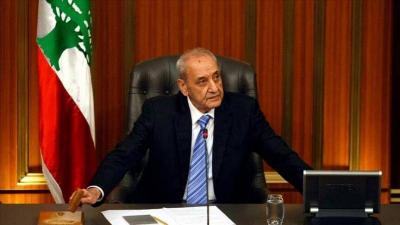Lebanon is entangled in two open dilemmas with various potential outcomes, and there seems to be no alleviation or breakthroughs on the horizon. The security crisis is escalating on the southern front, which has recently begun to roll towards more intense and violent levels, and despite American mediation, it has failed to cool it down or remove it from the realm of military threats. As for the presidential front, it is driven by the same mentalities and orientations that have been deepening the internal rift for nearly a year and a half, reiterating daily the reasons preventing the election of a president. The presidential front, as indicated by all related facts and movements, does not suggest an imminent resolution. On the contrary, its horizon appears completely blocked, as acknowledged by a responsible source involved in the presidential file, who expressed serious concern that Lebanon may remain without a president for extended periods.
He stated to "Al-Jumhuriya": "A year and a half has passed, and we are still circling in the same mine-laden field of contradictions. We have not observed any retreat from any party regarding its conditions, which have frustrated internal efforts and attempts to draft a consensus on a president, defeated French efforts, as well as Qatari initiatives, and dashed the hopes of the five-member committee without taking advantage of the solution opportunities available for restoring political life in Lebanon. This undeniably confirms that some active parties in Lebanon do not want a president for the republic but do not want a country at all. This reinforces my conviction that we will remain in this state of presidential vacuum not only until the end of the current parliament's term but for many years."
In this context, Parliament Speaker Nabih Berri reiterated to "Al-Jumhuriya" that the natural path to resolving the presidential crisis is to sit at a dialogue table or discussion or consultation, under any title, at least for one day and at most a week, to draft a consensus for electing a president. This is the mandatory pathway that all components should take, away from posturing and bickering, followed by moving to parliamentary sessions to elect the president. Berri, who welcomed the five-member committee's activities and agreed with its five ambassadors on the priority of dialogue for reaching consensus on a president, still bets on achieving breakthroughs through this committee. He also wished that the political parties genuinely responded to the efforts of the Moderation Bloc MPs, who have been appreciated for trying to achieve the goal we seek to establish a consensus for electing the President of the Republic.
Berri indicated that he would meet today, Saturday, with the Moderation MPs, emphasizing that efforts should not cease until the desired goal is achieved, and we extract the presidency from the paralysis loop. Ultimately, there is no escaping the need for consensus on a president, especially since we are in a situation that obliges us to immediately start fortifying our internal status, beginning with the election of the President of the Republic.
On the southern front, the military situation is hanging on an escalation line, awaiting the outcome of the ceasefire negotiations in Gaza, which are wavering between stagnation, conditions, and complications. Well-informed sources who participated in meetings with the American mediator Amos Hochstein confirmed to "Al-Jumhuriya" that everything is hanging on the Gaza ceasefire. If a ceasefire is reached there, the situation here may calm down, and Hochstein will come to Lebanon again, but his visit, as we have learned, is contingent on the developments regarding the Gaza ceasefire. If a solution is achieved, he will come to consolidate the ceasefire on the southern front, according to a political solution project supported by a strong desire from the U.S. administration to cool down the southern front and prevent the expansion of the war's scope.
However, the same sources did not underestimate the complexities hindering the American solution project, denying claims that the new proposal brought by Hochstein is softer than previous proposals. They stated: "Regardless of any procedures or arrangements for any solution, our position is clear, and we have reiterated it plainly to the American mediator that Lebanon is fully and finally committed to Resolution 1701 and calls for its complete implementation in all its aspects, not fragmented or piecemeal implementation. Most importantly, is providing full support to the Lebanese army with all necessary capabilities to enable it to perform its duties in the area designated by Resolution 1701 to the fullest extent. We advocate for a solution that ensures Lebanon's security, not a solution that guarantees Israel's safety and allows it to gain an upper hand at Lebanon's expense and the residents of the southern areas near the border."
When "Al-Jumhuriya" asked a senior official if there was hope for a solution from the ongoing movements to cool down the southern front, he replied: "In the current situation, I don't see any hope. However, when we see that a ceasefire has been achieved in Gaza and gunfire has ceased, then we can say that there is hope for reaching a solution on the Lebanese front. We believe the ball is in the Americans' court. They claim that they are wary of war and do not want it to expand into a broader regional conflict. The solution lies in their ability to restrain Israel and prevent it from escalating the situation, and they are capable of doing so. In discussions and talks, we hear words, but on the ground, we do not perceive actions and do not believe that the United States cannot exert pressure on Israel to stop its aggressions against Lebanon."
In response to a question about the likelihood of war, the same official revealed that the majority of foreign diplomats and envoys previously conveyed serious warnings regarding Israeli threats and stated that discussions of war should be placed among the possible scenarios. However, the answer to this question should be derived from the ongoing discussions within Israel, which warn of the consequences of such a war and the significant immediate and future costs it would entail for Israel. The Pentagon previously concluded, in parallel with Israeli threats against Lebanon, that it is impossible for Israel to achieve victory in a war it would wage against Lebanon.
Regarding reports in Israeli media about preparations for a plan for an operation against Lebanon, he said: "All of Lebanon would be in this case in a position to defend our country and resist any aggression against us." Israeli Channel 13 mentioned yesterday that Israeli Chief of Staff Herzi Halevi instructed the preparation of plans for a potential ground operation in Lebanon and to take lessons from the Gaza war. To this end, Halevi tasked General Chico Tamir, who planned the ground operation in Gaza, with strategizing a new ground operation in Lebanon.
Notably, as reported by Channel 13 itself, the Israeli army is currently unable to invade Lebanon and establish a security belt up to the Litani River or to remove all Hezbollah elements from the borders, stating: "Unfortunately, we have awakened from this dream." In the same context, Israeli media indicated a categorical denial in Israel regarding deadlines, such as March 15, for Hezbollah regarding a political agreement.
On another front, Israeli media discussed the difficulty of returning to live in the northern settlements and the challenges faced by the Israeli army in protecting the settlers. Yedioth Ahronoth reported that settlers evacuated from the north are still far from their settlements, waiting for a response from decision-makers for the past five months. It is expected that leaders of the evacuated northern settlements will meet on Sunday, after five months of uncertainty, frustration, and fear for their future. The mayor of Shlomi stated: "We must go to Jerusalem and demand answers because we feel abandoned and that the government ignores us." Moshe Davidovich, head of the Matit Asher Regional Council and leader of the Frontline Forum, explained to the newspaper: "The promises made to us were recorded on a sheet of ice, and the state continues to make things difficult for business owners, farmers, and the settlers living under war with no hope and no certainty, while the state behaves as if there were no war."
The newspaper noted that in recent months, the north has been in a continuous state of war, adding that rockets, anti-tank missiles, mortars, and suicide drones are launched from Lebanon every day, and the area has become a semi-abandoned Israeli security belt. Numerous Israeli reports have addressed the current reality of the northern settlements, stating that they have turned, in recent months, into one of the most dangerous areas in Israel, suffering immense damage sustained by about 500 homes and various infrastructures. Reports indicated that the northern settlements have incurred damage affecting economic activities that have nearly come to a halt, with agricultural and commercial activities of the residents stopping completely. Previously, Israeli media have mentioned that the greatest achievement in the north is attributed to "Hezbollah" for displacing about 100,000 Israelis from their homes.




